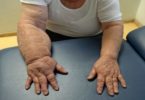What's in this article?
Is HIV the same as AIDS?
HIV (Human Immunodeficiency Virus) is a virus that weakens the immune system, making it harder to fight off infections. While HIV causes AIDS (Acquired Immune Deficiency Syndrome), people who test positive for HIV do not necessarily have AIDS. Scary as this may sound, it’s possible to have HIV for years and not develop or show any signs of the disease. The only way to know is to get tested. And, with medication, people can be HIV + and maintain a good quality of life for a long time. According to the CDC, about 1.1 million people in the U.S. are living with HIV. 250,000 people are estimated to be living with undiagnosed HIV, meaning that they do not know they have the virus.
What are the symptoms of HIV in women?
In general, the symptoms of HIV in women aren’t all that different to those a man would experience:
- Early stages of HIV: A short “flu-like” illness that occurs about 2 weeks after infection. Read more about the symptoms of HIV.
- Mid-stage HIV: A latency period of up to ten years where few (if any) symptoms are experienced. Swollen or painful glands are likely to be the main indication of an HIV infection during this time.
- Advanced HIV: Constitutional symptoms such as fatigue, weight-loss and dementia can signify a HIV infection is advancing into its later stages.
However, there are some vaginal HIV symptoms that occur in women only:
- Vaginal yeast infections.
- Abnormal Pap smears.
- Pelvic inflammatory disease.
- Unusual menstrual cycles.
There are also some HIV symptoms that are more common in women than men, such as psychological symptoms.
Initial symptoms of HIV in women are often vague and easily missed. If they’re noticeable, it’s still common for women to confuse the symptoms with those of another illness (“I think I may just have the flu”). This lack of recognition creates a host of issues for the female patient, as her health is at risk if she doesn’t receive prompt, early treatment.
HIV symptoms in women include:
- fever
- swollen lymph nodes
- sore throat
- skin rash
- muscle soreness
- joint pain
- fatigue
- nausea/vomiting
- night sweats
Lowering Risk of Getting HIV
HIV is transmitted through bodily fluids. This can happen when drug users share needles or through sexual intercourse. To reduce the risk of HIV infection, don’t share needles. Unless you have a single sexual partner who is HIV-negative (and as long as you are their only partner), always use a condom and use it properly.
Women should not douche after sex. It provides no protection against transmission of HIV. Also, douching can alter the natural bacterial balance of yeast in the vagina, increasing the risk of HIV and STDs, or making an existing infection worse.






Leave a Comment